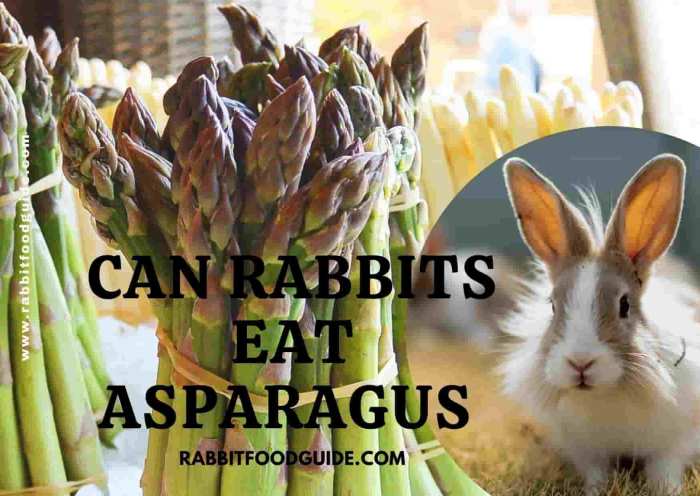Asparagus is a delicious and nutritious vegetable that is enjoyed by many people around the world. But can rabbits eat asparagus? The answer is yes, rabbits can eat asparagus in moderation. Asparagus is a good source of vitamins, minerals, and fiber, which are all essential for a healthy rabbit diet.
However, it is important to note that asparagus can also cause digestive problems in rabbits if it is not fed in moderation. Rabbits that eat too much asparagus may experience gas, bloating, and diarrhea. Therefore, it is important to feed asparagus to your rabbit in small amounts and to monitor them for any signs of digestive distress.
Nutritional Benefits of Asparagus for Rabbits

Asparagus is a nutritious vegetable that can provide several health benefits for rabbits. It is a good source of vitamins, minerals, and nutrients that are essential for a rabbit’s overall health and well-being.
Some of the key nutritional benefits of asparagus for rabbits include:
Vitamins
- Vitamin A: Essential for vision, immune system function, and skin health.
- Vitamin C: Supports the immune system, helps prevent scurvy, and promotes healthy skin and bones.
- Vitamin K: Involved in blood clotting and bone health.
Minerals
- Calcium: Essential for strong bones and teeth.
- Potassium: Helps regulate blood pressure and fluid balance.
- Iron: Necessary for red blood cell production.
Other Nutrients
- Fiber: Promotes digestive health and prevents constipation.
- Antioxidants: Help protect cells from damage caused by free radicals.
Potential Risks and Concerns
While asparagus offers nutritional benefits, it’s essential to be aware of potential risks associated with its consumption by rabbits.
Excessive intake of asparagus can lead to digestive issues, primarily gas and bloating. These symptoms arise due to the presence of certain compounds in asparagus that can be difficult for rabbits to digest. Furthermore, the high fiber content can contribute to gastrointestinal discomfort if not consumed in moderation.
Moderation and Proper Preparation
To minimize these risks, it’s crucial to feed asparagus to rabbits in moderation. Introduce it gradually, starting with small amounts and monitoring your pet’s reaction. Proper preparation is also essential. Cooking asparagus before feeding it to rabbits can help break down some of the indigestible compounds, reducing the likelihood of digestive upset.
Serving Recommendations
Introducing asparagus into a rabbit’s diet requires careful consideration of portion size. The recommended amount varies depending on the rabbit’s age, weight, and overall health.
For young rabbits under 6 months old, asparagus should be limited to occasional treats. A small piece, no larger than a thumbnail, once or twice a week is sufficient. As rabbits mature, they can gradually consume more asparagus, but it should never exceed 10% of their daily diet.
Incorporating Asparagus into a Rabbit’s Diet
To prevent overfeeding, incorporate asparagus into a rabbit’s diet gradually. Start with small amounts and observe your rabbit’s response. If there are no signs of digestive upset, you can slowly increase the portion size over time.
Asparagus can be offered fresh, cooked, or steamed. Avoid adding any seasonings or sauces, as these can be harmful to rabbits. If you choose to cook the asparagus, ensure it is cooled before offering it to your rabbit.
Monitor your rabbit closely after introducing asparagus into their diet. If you notice any changes in behavior or appetite, discontinue feeding asparagus and consult a veterinarian.
Preparation Methods
Preparing asparagus for rabbits requires careful attention to ensure their safety and nutritional well-being. Both raw and cooked asparagus offer benefits, but each has its own considerations.
Raw Asparagus
Raw asparagus is a crunchy and nutritious option for rabbits. It retains its natural vitamins, minerals, and fiber, making it a valuable addition to their diet. However, it should be thoroughly washed and inspected for any signs of spoilage or wilting.
Cooked Asparagus
Cooking asparagus can enhance its digestibility and reduce the risk of gas or digestive upset in some rabbits. Steaming or boiling asparagus for a few minutes until it is tender-crisp is the recommended method. Avoid adding any seasonings or salt, as these can be harmful to rabbits.
Cleaning and Preparation
- Rinse asparagus thoroughly under cold water to remove any dirt or debris.
- Trim the woody ends of the asparagus, approximately 1-2 inches from the bottom.
- Cut the asparagus into bite-sized pieces, about 1-2 inches in length.
- For raw asparagus, feed it immediately after cleaning and trimming.
- For cooked asparagus, steam or boil the pieces for 3-5 minutes, or until tender-crisp.
Monitoring and Observation
After your rabbit has consumed asparagus, it’s essential to monitor them closely to ensure they don’t experience any digestive distress.
Observe your rabbit for signs such as:
- Diarrhea
- Gas
- Abdominal pain
- Lethargy
If you notice any of these signs, discontinue feeding asparagus and consult with a veterinarian promptly.
Final Conclusion
Overall, asparagus can be a healthy and nutritious addition to your rabbit’s diet. However, it is important to feed it in moderation and to monitor your rabbit for any signs of digestive distress. If you have any concerns about feeding asparagus to your rabbit, be sure to consult with your veterinarian.
Helpful Answers
How much asparagus can I feed my rabbit?
You can feed your rabbit 1-2 spears of asparagus per week.
Can I feed my rabbit raw asparagus?
Yes, you can feed your rabbit raw asparagus. However, it is important to wash the asparagus thoroughly before feeding it to your rabbit.
Can I feed my rabbit cooked asparagus?
Yes, you can feed your rabbit cooked asparagus. However, it is important to avoid feeding your rabbit asparagus that has been seasoned with salt or other spices.
What are the signs of digestive distress in rabbits?
The signs of digestive distress in rabbits include gas, bloating, diarrhea, and loss of appetite. If you notice any of these signs in your rabbit, you should stop feeding them asparagus and consult with your veterinarian.